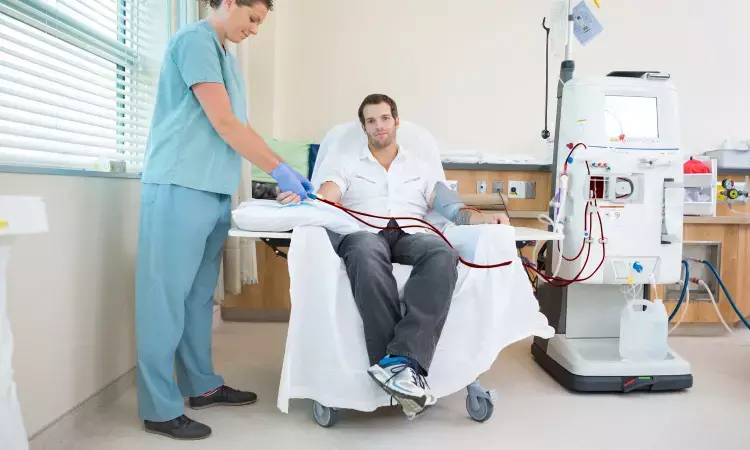- Home
- Medical news & Guidelines
- Anesthesiology
- Cardiology and CTVS
- Critical Care
- Dentistry
- Dermatology
- Diabetes and Endocrinology
- ENT
- Gastroenterology
- Medicine
- Nephrology
- Neurology
- Obstretics-Gynaecology
- Oncology
- Ophthalmology
- Orthopaedics
- Pediatrics-Neonatology
- Psychiatry
- Pulmonology
- Radiology
- Surgery
- Urology
- Laboratory Medicine
- Diet
- Nursing
- Paramedical
- Physiotherapy
- Health news
- Fact Check
- Bone Health Fact Check
- Brain Health Fact Check
- Cancer Related Fact Check
- Child Care Fact Check
- Dental and oral health fact check
- Diabetes and metabolic health fact check
- Diet and Nutrition Fact Check
- Eye and ENT Care Fact Check
- Fitness fact check
- Gut health fact check
- Heart health fact check
- Kidney health fact check
- Medical education fact check
- Men's health fact check
- Respiratory fact check
- Skin and hair care fact check
- Vaccine and Immunization fact check
- Women's health fact check
- AYUSH
- State News
- Andaman and Nicobar Islands
- Andhra Pradesh
- Arunachal Pradesh
- Assam
- Bihar
- Chandigarh
- Chattisgarh
- Dadra and Nagar Haveli
- Daman and Diu
- Delhi
- Goa
- Gujarat
- Haryana
- Himachal Pradesh
- Jammu & Kashmir
- Jharkhand
- Karnataka
- Kerala
- Ladakh
- Lakshadweep
- Madhya Pradesh
- Maharashtra
- Manipur
- Meghalaya
- Mizoram
- Nagaland
- Odisha
- Puducherry
- Punjab
- Rajasthan
- Sikkim
- Tamil Nadu
- Telangana
- Tripura
- Uttar Pradesh
- Uttrakhand
- West Bengal
- Medical Education
- Industry
Cold dialysate decreases intradialytic hypotension in hemodialysis patients without improving nutritional and inflammatory status

After six months of dialysate cooling, there was a decrease in the levels of inflammatory markers and the frequency of hypotensive episodes during dialysis. However, the patient's midarm circumference decreased, and their malnutrition inflammation score (MIS) deteriorated.
This study, "Could cooling dialysate improve inflammatory and nutritional status of hemodialysis patients?" is led by Asmaa Elemshaty and is published in BMC Nephrology.
Reducing the dialysate temperature to 0.5 °C below central body temperature (dialysate cooling) decreases the likelihood of intradialytic hypotension. However, other factors affecting hemodialysis patients have not been thoroughly investigated. This research aimed to evaluate the impact of individualized dialysate cooling on nutritional and inflammatory parameters in chronic hemodialysis (HD) patients in 70 patients. It divided them into control and intervention groups. The standard dialysate temperature in the control and intervention group was 37 °C and 0.5 °C below core body temperature, respectively. MIS score was calculated.
The study results could be summarised as:
- Following six months of dialysate cooling, intradialytic hypotension episodes were reduced in the intervention group.
- Following dialysate cooling, there was a decrease in Serum ferritin, transferrin saturation (TSAT), high sensitive C-reactive protein (HS-CRP), and Interleukin-6 (IL-6).
- IL-6 dropped, but serum ferritin, TSAT, albumin, and HS-CRP rose in the control group.
- There was a drop in levels of haemoglobin In both groups.
- There was an increase in erythrocyte sedimentation rate (ESR) in both groups' midarm muscle circumference, and MIS worsened.
They said Cold dialysate decreased intradialytic hypotension with no significant improvement in nutritional and inflammatory surrogates.
Long-duration studies, including many patients, should be conducted to adequately assess its effect on inflammation and nutrition in chronic hemodialysis patients.
This study had limitations like a small number of patients, short duration, failure to control the trivial events, etc.
Cool dialysate for hemodialysis patients is safe and feasible, though it protected the patient from intra-dialytic hypotension but was not associated with better nutrition or inflammation.
Further reading:
Elemshaty, A., Sayed-Ahmed, N., Mesbah, A. et al. Could cooling dialysate improve the inflammatory and nutritional status of hemodialysis patients? BMC Nephrol 24, 255 (2023). https://doi.org/10.1186/s12882-023-03305-z
BDS, MDS in Periodontics and Implantology
Dr. Aditi Yadav is a BDS, MDS in Periodontics and Implantology. She has a clinical experience of 5 years as a laser dental surgeon. She also has a Diploma in clinical research and pharmacovigilance and is a Certified data scientist. She is currently working as a content developer in e-health services. Dr. Yadav has a keen interest in Medical Journalism and is actively involved in Medical Research writing.
Dr Kamal Kant Kohli-MBBS, DTCD- a chest specialist with more than 30 years of practice and a flair for writing clinical articles, Dr Kamal Kant Kohli joined Medical Dialogues as a Chief Editor of Medical News. Besides writing articles, as an editor, he proofreads and verifies all the medical content published on Medical Dialogues including those coming from journals, studies,medical conferences,guidelines etc. Email: drkohli@medicaldialogues.in. Contact no. 011-43720751


